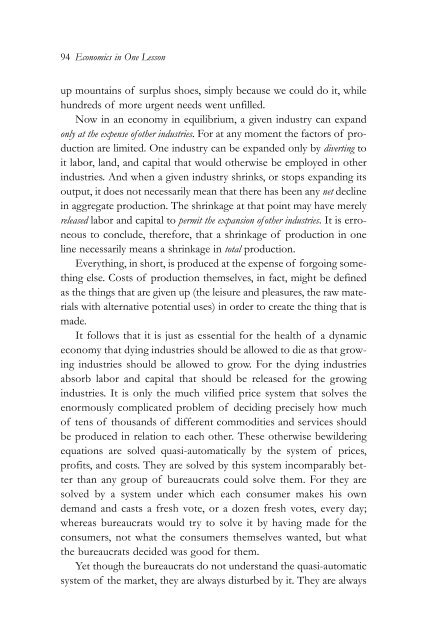1gDdM7w
1gDdM7w
1gDdM7w
- No tags were found...
Create successful ePaper yourself
Turn your PDF publications into a flip-book with our unique Google optimized e-Paper software.
94 Economics in One Lessonup mountains of surplus shoes, simply because we could do it, whilehundreds of more urgent needs went unfilled.Now in an economy in equilibrium, a given industry can expandonly at the expense ofother industries. For at any moment the factors of productionare limited. One industry can be expanded only by diverting toit labor, land, and capital that would otherwise be employed in otherindustries. And when a given industry shrinks, or stops expanding itsoutput, it does not necessarily mean that there has been any net declinein aggregate production. The shrinkage at that point may have merelyreleased labor and capital to permit the expansion ofother industries. It is erroneousto conclude, therefore, that a shrinkage of production in oneline necessarily means a shrinkage in total production.Everything, in short, is produced at the expense of forgoing somethingelse. Costs of production themselves, in fact, might be definedas the things that are given up (the leisure and pleasures, the raw materialswith alternative potential uses) in order to create the thing that ismade.It follows that it is just as essential for the health of a dynamiceconomy that dying industries should be allowed to die as that growingindustries should be allowed to grow. For the dying industriesabsorb labor and capital that should be released for the growingindustries. It is only the much vilified price system that solves theenormously complicated problem of deciding precisely how muchof tens of thousands of different commodities and services shouldbe produced in relation to each other. These otherwise bewilderingequations are solved quasi-automatically by the system of prices,profits, and costs. They are solved by this system incomparably betterthan any group of bureaucrats could solve them. For they aresolved by a system under which each consumer makes his owndemand and casts a fresh vote, or a dozen fresh votes, every day;whereas bureaucrats would try to solve it by having made for theconsumers, not what the consumers themselves wanted, but whatthe bureaucrats decided was good for them.Yet though the bureaucrats do not understand the quasi-automaticsystem of the market, they are always disturbed by it. They are always


